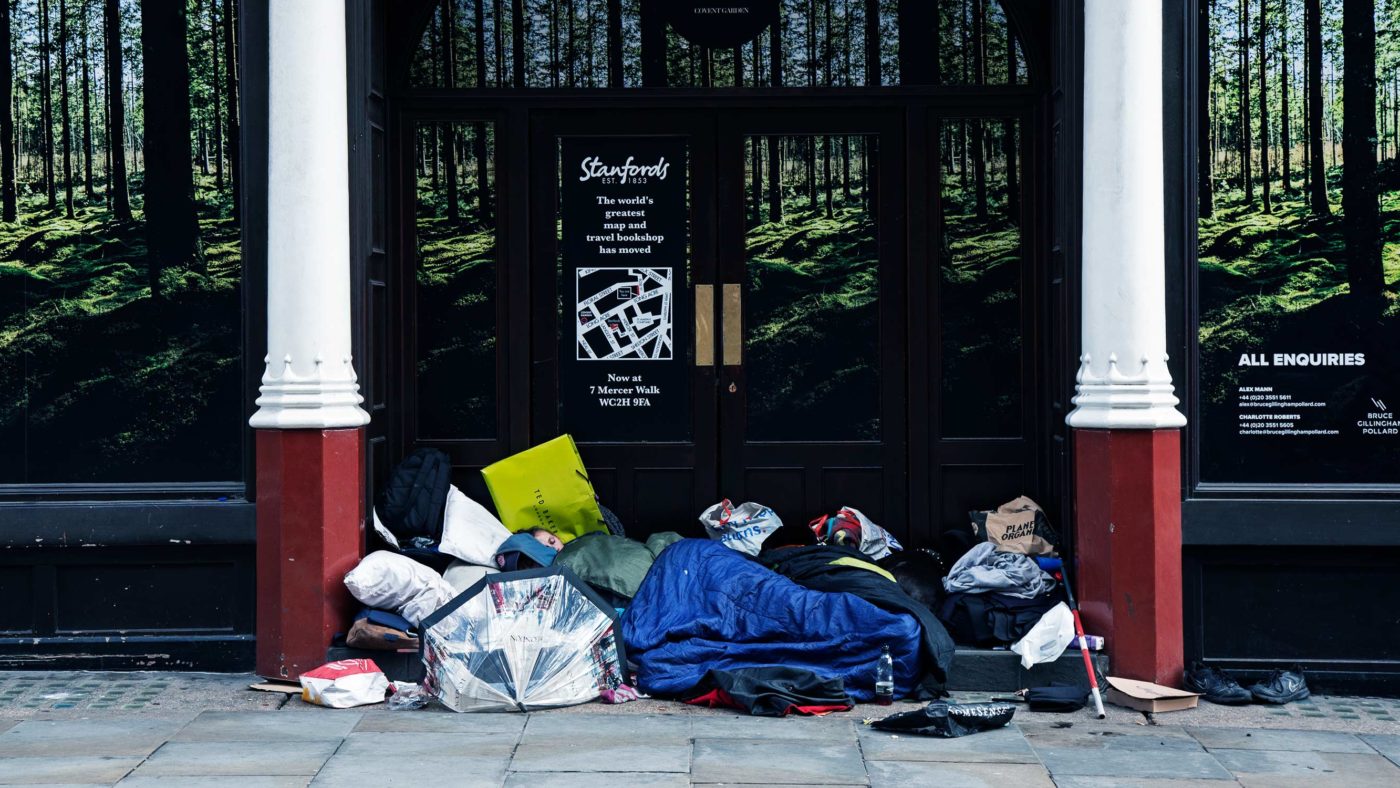Recent Government proposals to decriminalise vagrancy – that Victorian sobriquet for rough sleepers who beg – are an attempt to end an entrenched problem in Britain’s town centres. Shoppers in our towns and cities would be forgiven for thinking that any idea of enforcement, fair or not, against the people they step over and around on a daily basis had been long abandoned. But will this act of performative compassion actually help those most in need get a roof over their heads?
While homelessness is variously described as poor, temporary or unsuitable accommodation, the most dangerous and visible manifestation that this proposed legislative reform seeks to help is rough sleeping. There has long been a problem with quantifying the exact numbers of this category, as local authorities conduct their own sporadic counts, usually on single nights.
Moreover, indigent people do not make for great census participants. The latest official estimates of these figures suggested that on one night in Autumn 2021 there were 2,440 people sleeping in shop doorways, parks, underpasses and pavements. This was the fourth consecutive year of decline in those numbers, so something is going right – most notably the effects of the Government’s 2019 ‘Everybody In’ strategy to house rough sleepers during the national Covid lockdown.
While organisations such as the Salvation Army warn that, based on their street level experience, the true figure is likely higher, it’s actually surprising how small the problem is. To put it in context, this country managed to put a roof over the heads of 4,000 Afghans seeking sanctuary here with little notice. Intensive support strategies put in place since the high watermark of rough sleeping in 2017 – such as Housing First in England – are having an impact, but it seems those who remain on the streets are some of the most difficult to help.
This is in part because their profile includes large umbers of people who in the jargon have ‘no recourse to public funds’. These are predominantly migrants who have not entered the country by legal means and do not qualify for any of our mainstream social welfare benefits. Whatever your view on migration policy, official destitution of those here is a regressive response. But they also comprise prison, care and hospital leavers, many with multiple complex and challenging mental and physical health conditions. There are also women fleeing domestic violence. They are joined by military veterans suffering from PTSD and alcoholism. But being ‘hard to shift’ is no reason to stop caring.
Let’s be clear here. Not all of these people are well behaved. Some cannot comply with the rules, a few will not. There is criminality and exploitation mixed in. Aggressive begging, alarming and antisocial behaviour is not uncommon and is very rarely enforced. Town centre businesses, already on their knees economically, have enough problems to face without shoppers being driven away by distressed or angry people, or those shoplifting to survive.
The police don’t need any additional powers to deal with unacceptable behaviour though. There are more than enough public order laws and council byelaws to do this job, there just aren’t enough cops to cope. And where exactly do you move a homeless person who is creating nuisance on to? Many of the incidents the police do eventually intervene with involve people suffering hugely distressing mental health crises or in the throes of addiction. In large parts of the country, the only – totally unsuitable – place of safety available for them is a police cell tying up more yet scarce resources.
Whether the Vagrancy Act is scrapped or not, enforcement is important. The successful public heath response to knife crime in Scotland was built on enforcement, as few of its cheerleaders ever acknowledge. For those willing to be helped there was the chance to transform their lives. A public health response to rough sleeping needs to contain the same elements to actively and assertively encourage people who can get off the streets. Infantilising people as being endlessly vulnerable never works.
Critics of this perspective will say, quite rightly, that the majority of rough sleepers do not regard spending their nights wrapped in cardboard being urinated on by passers-by as a career choice . The health outcomes for those trapped on our streets are horrendous. A recent parliamentary briefing laid this bare:
‘In 2020, an estimated 688 homeless people died in England and Wales. Men accounted for the majority of deaths. The average age of death was 45.9 years for men and 41.6 years for women. Most deaths recorded were due to drug-related poisoning, suicide, and alcohol-specific causes.’
We are the fifth biggest economy in the world. This is a shaming and totally unacceptable stain on our nation’s character..
If we can get thousands of Afghans into hotels and thousands of Ukrainians into people’s homes, we can surely do what is necessary to put about half the capacity of the Royal Albert Hall into stable, safe and long-term accommodation. Not in a five-year strategy that won’t survive the political attention span but in the next few months.
Helping people recover from addiction and mental health problems to avoid reoffending or violence, to overcome the pure bad luck that but for the grace of god go we, is far easier if that person has an address. Plenty more people hammered by the cost-of-living crisis may well be facing homelessness this winter and they might be forgiven for wondering why junkies and beggars should get priority. But try talking to a homeless person the next time you’re in town rather than crossing the street. The truth is that many of them had a future once.
With a bit of muscular humanity we can restore it again.
Click here to subscribe to our daily briefing – the best pieces from CapX and across the web.
CapX depends on the generosity of its readers. If you value what we do, please consider making a donation.


